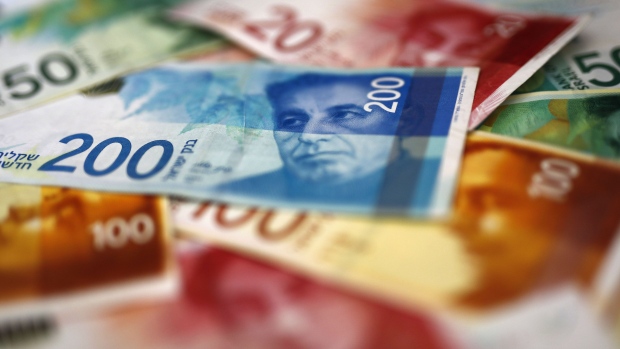Apr 15, 2024
Emerging Currencies Settle as Shekel Bounces Back After Attack
, Bloomberg News

(Bloomberg) -- Emerging-market currencies sank to the lowest in almost three months after US retail sales data came in much stronger than expected and as Israel’s vow to respond to Iran’s attack kept geopolitical tensions high.
Latin American currencies were among the worst performing in the developing world as the figures from the world’s largest economy cemented bets the Federal Reserve won’t rush to cut interest rates. WTI crude erased losses, following a brief reprieve amid easing tensions in the Middle East, as top Israeli military officials reasserted that their country has no choice but to respond to Iran’s attack.
“If there’s an actual military response from Israel, the risk would be associated with a rise in oil prices and a tendency to reduce positions in risk assets,” said Fernando Losada, a managing director at Oppenheimer & Co.
The Vanguard FTSE Emerging Markets (VWO), the largest US-listed exchange-traded fund for developing world stocks, closed lower for a second session. An index for Latin American stocks slid to the lowest since November, while a broad gauge of emerging-market shares slid a third day.
The decline in emerging-market assets come even as Federal Reserve Bank of New York President John Williams said the central bank will likely start lowering interest rates this year if inflation continues to gradually come down.
“The US data points to high growth, which is still challenging for the Fed,” said Alvaro Vivanco, head of emerging markets at NatWest Markets.
Real slips
The Colombian peso led currency losses along with the Brazilian real, which fell to the lowest in more than a year as President Luiz Inacio Lula da Silva’s administration will target a less ambitious 2025 fiscal outcome than previously indicated.
Read more: Brazil Weakens Key 2025 Budget Target as Spending Rises
“This changes the expectations for Lula’s administration,” Vivanco said before the change was made official. “It’s a reaction to lower growth that isn’t priced in. It’s a negative surprise.”
Geopolitical Tensions
MSCI’s EM currency gauge had swung between gains and losses prior to the US data, as investors bet that Iran’s attack on Israel over the weekend wouldn’t be immediately followed by a major escalation in the conflict.
The shekel held onto gains after Israel’s military officials their country has no choice but to respond to the weekend’s attack. The currency jumped as much as 1.3% against the dollar earlier after Iran said “the matter can be deemed concluded,” and some Western allies urged Israeli Prime Minister Benjamin Netanyahu to avoid further flare-ups.
Read more: Oil Unruffled by Iran’s Assault on Israel as Brent Turns Lower
Mexico’s peso weakened amid the renewed risk aversion in markets, though hedge funds continue to boost their bullish bets on the currency, according to the latest data from the Commodity Futures Trading Commission.
Ghana’s dollar bonds were the worst performers in emerging markets even as they trimmed a decline after Finance Minister Amin Adam said that significant progress has been made on debt restructuring negotiations with bondholders, rejecting a report that talks have broken down.
--With assistance from Srinivasan Sivabalan and Giovanna Bellotti Azevedo.
©2024 Bloomberg L.P.






